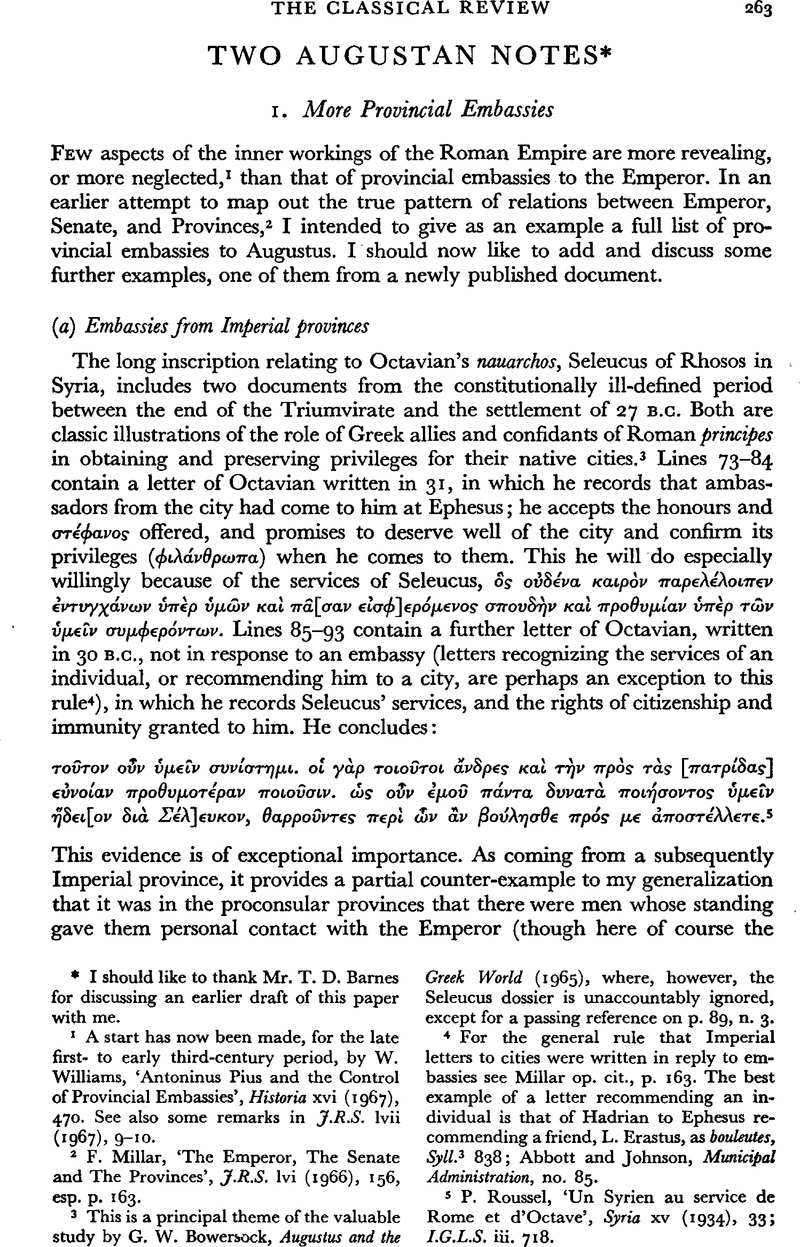Article contents
Two Augustan notes*
Published online by Cambridge University Press: 27 February 2009
Abstract

Information
- Type
- Review Article
- Information
- Copyright
- Copyright © The Classical Association 1968
References
page 263 note 1 A start has now been made, for the late first-to early third-century period, by Williams, W., ‘Antoninus Pius and the Control of Provincial Embassies’, Historia xvi (1967), 470Google Scholar. See also some remarks in J.R.S. lvii (1967), 9–10.
page 263 note 2 Millar, F., ‘The Emperor, The Senate and The Provinces’, J.R.S. lvi (1966), 156, esp. p. 163Google Scholar.
page 263 note 3 This is a principal theme of the valuable study by Bowersock, G. W., Augustus and the Greek World (1965)Google Scholar, where, however, the Seleucus dossier is unaccountably ignored, except for a passing reference on p. 89, n. 3.
page 263 note 4 For the general rule that Imperial letters to cities were written in reply to embassies see Millar op. cit., p. 163. The best example of a letter recommending an individual is that of Hadrian to Ephesus recommending a friend, L. Erastus, as bouleutes, Syll.3 838; Abbott and Johnson, Municipal Administration, no. 85.
page 263 note 5 Roussel, P., ‘Un Syrien au service de Rome et d'Octave’, Syria xv (1934), 33CrossRefGoogle Scholar; I.G.L.S. iii. 718.
page 264 note 1 Millar, op. cit., p. 166.
page 264 note 2 O.G.I.S. 262; Abbott and Johnson, Municipal Administration, no. 147.
page 264 note 3 See Welles, C. B., Royal Correspondence in the Hellenistic Period (1934), no. 70.Google Scholar
page 264 note 4 For the alternatives see Williams, op. cit.
page 264 note 5 Pliny, N.H. viii. 218: ‘certum est Baliaricos adversus proventum eorum auxilium militare a divo Augusto petisse.’ A different occasion is probably referred to in Strabo 144: οἱ δ⋯ τ⋯ς Γυμνησ⋯ας οἰκο⋯ντες λ⋯γονται πρεσβε⋯σασθα⋯ ποτε πρ⋯ς ῾Ρωμα⋯ους κατ⋯ χώρας αἴτησιν ⋯κβ⋯λλεσθαι γ⋯ρ ὑπ⋯ τ⋯ν ζῴων το⋯των.
page 264 note 6 Josephus, B.J. ii. 111; A.J. xvii. 342.
page 264 note 7 I.G.R. iv. 1693.
page 264 note 8 Herrmann, P., ‘Inschriften römischer Zeit aus dem Heraion von Samos’, Athenische Mitteilungen lxxv (1960), 68Google Scholar. See L., and Robert, R., Bull. Épig. 1965, 309.Google Scholar
page 265 note 1 Published by A. K. Orlandos in Πρακτικ⋯ 1960 (pub. 1966), p. 215, no. 4, and ‘Δ⋯ο ⋯πιγραφα⋯ ⋯κ Μεσσ⋯νης’, Ἀρχ. Ἐφ. 1965 (pub. 1967), 110.
page 265 note 2 As suggested, for instance, by Jones, A. H. M., Studies in Roman Government and Law (1960), p. 3.Google Scholar
page 265 note 3 R.I.C. i, Augustus, no. 10; Sutherland, C. H. V., Coinage in Roman Imperial Policy (1951), p. 31Google Scholar.
page 265 note 4 Vell. Pat. ii. 89.
page 265 note 5 C.I.L. i2, p. 231: cf. Res Gestae 34.
page 265 note 6 C.I.L. vi. 1527, ii. 35; see Durry, M., Éloge funèbre d'une matrone romaine (éloge dite de Turia) (1950), ad locGoogle Scholar.
page 265 note 7 Dio liii. 21. 6.
page 265 note 8 Dio liii. 13. 2.
page 265 note 9 Suet. Div. Aug. 28. Dio takes up the notion solely to introduce the speeches of Agrippa and Maecenas, lii. I. 1: κα⋯τοι το⋯ Κα⋯σαρος βουλευσαμ⋯νου τ⋯ τε ὅπλα καταθ⋯σθαι κα⋯ τ⋯ πρ⋯γματα τῇ τε γερουσ⋯ᾳ κα⋯ τῷ δ⋯μῳ⋯πιτρ⋯ψαι … See Millar, F., A Study of Cassius Dio (1964), 105.Google Scholar
- 2
- Cited by

